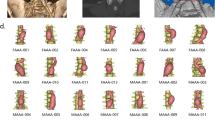Abstract
It has been postulated that gender differences in abdominal aortic aneurysm (AAA) rupture risk are due to variation in proportional dilatation. This study’s purpose was to examine differences in relative dilatation of AAAs as related to rupture risk and repair thresholds. During a recent 20-month period (August 2003-March 2005), all patients receiving elective endovascular repair of an AAA underwent computer-generated computed tomographic measurements, including suprarenal aortic diameter (D1) and maximum aneurysm diameter (D3). As a measure of proportional dilatation, a D3/D1 ratio was calculated for each patient and compared between genders. Values for males and females were plotted separately (D3 vs. D3/D1), and the resulting linear regression equations allowed for the comparison of proportional dilatation of aneurysms between genders. In 129 patients (108 males, 21 females), mean D3 did not differ between genders (62 ± 9.0 vs 63.4 ± 10.8 mm, p = 0.89), while relative dilatation (D3/D1) was significantly greater in females compared to males (2.82 ± 0.52 vs. 2.55 ± 0.42, p = 0.02). Linear regression analysis allowed for comparison of D3 as a function of D3/D1 and correlated a 55 mm AAA in males with one of 52 mm in females. These differences became greater with increasing AAA diameters (e.g., 60 and 70 mm AAAs in a male were proportionally similar to 56 and 62 mm AAAs in a female). AAAs of equal diameter represent a greater proportional dilatation in females than in males. This supports the recommendation for a smaller aneurysm diameter (52 mm) threshold for repair in females rather than the commonly used 55 mm threshold in males. Also, these data suggest that the gender difference in rupture risk widens exponentially as aneurysm diameter, and thereby proportional dilatation, increases above this repair threshold.



Similar content being viewed by others
References
Johnston KW, Rutherford RB, Tilson MD, et al., for the Subcommittee on Reporting Standards for Arterial Aneurysms. Suggested standards for reporting on arterial aneurysms. J Vasc Surg 1991;13:444–450
Nevitt MP, Ballard DJ, Hallett JW. Prognosis of abdominal aortic aneurysms. A population-based study. N Engl J Med 1989;321:1009–1014
Krupski WC, Rutherford RB. Update on open repair of abdominal aortic aneurysms: the challenges for endovascular repair. J Am Coll Surg 2004;199:946–961
Lederle FA, Wilson SE, Johnson GR, et al., for the Aneurysm Detection and Management Veterans Affairs Cooperative Study Group. Immediate repair compared with surveillance of small abdominal aortic aneurysms. N Engl J Med 2002;346:1437–1444
United Kingdom Small Aneurysm Trial Participants. Long-term outcomes of immediate repair compared with surveillance of small abdominal aortic aneurysms. N Engl J Med 2002;346:1445–1452
Cronenwett JL, Johnston KW. The United Kingdom Small Aneurysm Trial: implications for surgical treatment of abdominal aortic aneurysms. J Vasc Surg 1999;29:191–194
Brown PM, Zelt DT, Sobolev B. The risk of rupture in untreated aneurysms: the impact of size, gender, and expansion rate. J Vasc Surg 2003;37:280–284
Sonesson B, Hansen F, Stale H, et al. Compliance and diameter in the human abdominal aorta – the influence of age and sex. Eur J Vasc Surg 1993;7:690–697
Horejs D, Gilbert PM, Burnstein S, et al. Normal aortic diameters by CT. J Comput Assist Tomogr 1988;12:602–603
Dixon AK, Lawrence JP, Mitchell JRA. Age-related changes in the abdominal aorta shown by computed tomography. Clin Radiol 1984;35:33–37
Singh K, Bρnaa KH, Jacobsen BK, et al. Prevalence of and risk factors for abdominal aortic aneurysms in a population-based study. The Tromsø study. Am J Epidemiol 2001;154:236–244
Brown LC, Powell JT. Risk factors for aneurysm rupture in patients kept under ultrasound surveillance. UK Small Aneurysm Trial Participants. Ann Surg 1999;230:289–296
Fillinger MF, Racusin J, Baker RK, et al. Anatomic characteristics of ruptured abdominal aortic aneurysm on conventional CT scans: implications for rupture risk. J Vasc Surg 2004;39:1243–1252
Semmens JB, Norman PE, Lawrence-Brown MMD, et al. Influence of gender on outcome from ruptured abdominal aortic aneurysm. Br J Surg 2000;87:191–194
Katz DJ, Stanley JC, Zelenock GB, et al. Gender differences in abdominal aortic aneurysm prevalence, treatment, and outcomes. J Vasc Surg 1997;25:561–568
Brown PM, Sobolev B, Zelt DT. Selective management of abdominal aortic aneurysms smaller than 5.0 cm in a prospective sizing program with gender-specific analysis. J Vasc Surg 2003;38:762–765
Solberg S, Singh K, Wilsgaard T, et al. Increased growth rate of abdominal aortic aneurysms in women. The Tromsø study. Eur J Vasc Endovasc Surg 2005;29:145–149
Darling RC, Brewster DC, Darling RC, et al. Are familial abdominal aortic aneurysms different? J Vasc Surg 1989;10:39–43
Woodrum DT, Ford JW, Ailawadi G, et al. Gender differences in rat aortic smooth muscle cell matrix metalloproteinase-9. J Am Coll Surg 2005;138:398–404
Hinchcliffe RJ, Alric P, Rose D, et al. Comparison of morphologic features of intact and ruptured aneurysms of infrarenal abdominal aorta. J Vasc Surg 2003;38:88–92
Vorp DA, Lee PC, Wang DH, et al. Association of intraluminal thrombus in abdominal aortic aneurysm with local hypoxia and wall weakening. J Vasc Surg 2001;34:291–299
Bengtsson H, Sonesson B, Bergqvist D. Incidence and prevalence of abdominal aortic aneurysms, estimated by necropsy studies and population screening by ultrasound. Ann N Y Acad Sci 1996;800:1–24
Author information
Authors and Affiliations
Corresponding author
About this article
Cite this article
Forbes, T.L., Lawlor, D.K., DeRose, G. et al. Gender Differences in Relative Dilatation of Abdominal Aortic Aneurysms. Ann Vasc Surg 20, 564–568 (2006). https://doi.org/10.1007/s10016-006-9079-y
Received:
Revised:
Accepted:
Published:
Issue Date:
DOI: https://doi.org/10.1007/s10016-006-9079-y




